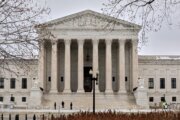WASHINGTON – Fairfax County Police Chief Ed Roessler is responding to a privacy lawsuit with a statement that calls license plate readers a valuable investigative tool.
The ACLU sued the county last week on behalf of a man whose car was photographed by license plate readers at least twice last year. The group argues that Fairfax County’s decision to keep the data for up to a year on when and where license plates were spotted is an invasion of privacy.
Roessler says in the statement that there are rules governing when the data is supposed to be accessed, and that retaining the data can help provide clues to solve a series of related crimes.
Virginia Governor Terry McAuliffe vetoed bills this spring that would have placed limits on license plate readers and other police technology. He has asked a panel to recommend changes to the bills that he can suggest to the General Assembly, which believed the bills it approved last year were an acceptable compromise.
The Fairfax County Police keep reader data for 364 days unless it is part of an active criminal investigation, while other agencies in the region vary — some deleting the data within a day; others, much longer than a year. The data includes an image of the license plate, and the location and the time of the photo.
The Fairfax County statement emphasizes that the cameras do not constantly track a car everywhere it goes, and that the database does not store identifying information such as the make and model of a car, the owner or home addresses. But the ACLU argues that all of that information is easy to discover based on the tags.
The lawsuit does not challenge the so-called “active” use of license plate readers, in which the cameras automatically check license plates against a database of cars that are reported stolen, tied to missing people, or those of interest to law enforcement.




